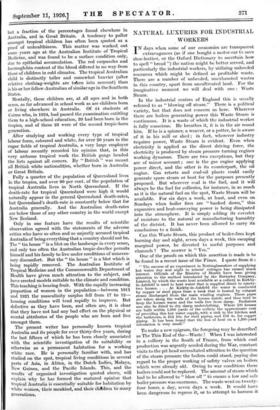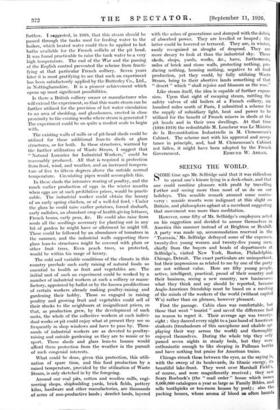NATURAL LUXURIES FOR INDUSTRIAL. WORKERS
IN days when some of our economies are transparent extravagances (as if one bought a motor-car to save shoe-leather, or the Oxford Dictionary to ascertain how to spell " bread ") the nation might be better served, and particularly the industrial workers, by utilizing unheeded resources which might be defined as profitable waste. There are a number of unheeded, unexhausted wastes in this country, apart from uncultivated land. For the imaginative moment we will deal with one : Waste Steam.
In the industrial centres of England this is usually referred to as " blowing off steam." There is a political variety, but that does not concern us here. Wherever there are boilers generating power this Waste Steam is continuous. It is a waste of which the industrial worker is fully conscious. He breathes it, it is in the air round him. If he is a spinner, a weaver, or a potter, he is aware of it in his mill or shed ; in fact, wherever industry requires power, Waste Steam is evident. Even when electricity is applied as the direct driving force, the electricity is produced by steam pressure turning engines working dynamos. There are two exceptions, but they are of minor account ; one is the gas engine applying power direct, and the other is its counterpart, the oil engine. Gas retorts and coal-oil plants could easily generate spare steam or heat for the purposes presently proposed. But wherever coal is the fuel, and it will always be the fuel for collieries, for instance, in so much as it is the natural fuel on the spot, Waste Steam will be available. For six days a week, at least, and even on Sundays when boiler fires are " banked down," this expansive and heat-conveying power is being dissipated into the atmosphere. It is simply adding its coverlet of moisture to the natural or manufacturing humidity of the district. It has never been allowed to carry its conclusions to a finish.
Can this Waste Steam, this product of boiler-fires kept burning day and night, seven days a week, this escaping marginal power, be diverted to useful purposes and channels ? The answer is " Yes."
One of the proofs on which this assertion is made is to be found in a recent issue of the Times. I quote from it : " The success of an experiment in Nottinghamshire of supplying hot water day and night to miners' cottages has caused much interest. Officials of the Ministry of Health have been giving attention to the method introduced by the Butterley Company, Limited, by which the waste heat available at a colliery in Kirkby- in-Ashfield is used to heat water that is supplied direct to ninety- two houses. . . . At Kirkby-in-Ashfield the water is conducted by copper or steel pipes from a tank that is heated by exhaust steam discharged from the main winding engines. These pipes are taken along the walls of the houses inside, and thus tend to keep the houses warm and the walls free from damp. Radiators can also be fitted to dry damp underclothing. Where 100 houses are built within 1,000 yards of the colliery the approximate coat of providing this hot water supply, with a sink in the kitchen and the bathroom, is £13 10s. for steel piping, and £16 4s. for copper piping. It has been found that the loss of heat on a 1,200-yard circulation is very small."
" To make a new epigram, the foregoing may be described as The Thin End of the—Waste ! When I was interested in a colliery in the South of France, from which coal production was urgently needed during the War, constant visits to the pit head necessitated attention to the question of the steam pressure the boilers could stand, paying due regard to the proper working of safety valves on boilers which were already old. Owing to war conditions these boilers could not be replaced. The amount of steam which had to be allowed to " blow off " to ensure a low and safe boiler pressure was enormous. The waste went on twenty- four hours. a day, seven days a week. It would have been dangerous to repress it, or to attempt to harness it further. I swggested, in 1919, that this steam should be passed through the tanks used for feeding water to the boilers, which heated water could then be applied to hot baths available for the French colliers at the pit head. It was found practicable to raise the tank water to a very high temperature. The end of the War and the passing of the English control prevented the scheme from fructi- fying at that particular French colliery. Seven years later it is most gratifying to see that such an experiment has been satisfactorily applied by the Butterley Co., Ltd., in Nottinghamshire. It is a pioneer achievement which opens up most significant possibilities.
Is there a British colliery owner or manufacturer who will extend the experiment, so that this waste steam can be further utilized for the provision of hot water circulation to an area of shedding, and glasshouses, erected in close proximity to the existing works where steam is generated ? The experiment could be on quite a modest scale to begin with.
The existing walls of mills or of pit-liead sheds could be utilized for these additional lean-to sheds or glass structures, or for both. In these structures, warmed by the further utilization of Waste Steam, I suggest that " Natural Luxuries for Industrial Workers," could be reasonably produced. All that is required is protection from frost, wind, and weather, and an increased tempera- ture of five to fifteen degrees above the outside normal temperature. Circulating pipes would accomplish this.
In these sheds the intensive rearing of poultry, and the much earlier production of eggs in the winter months when eggs are at such prohibitive prices, would be practi- cable. The industrial worker could obtain the luxury of an early spring chicken, or of a well-fed fowl. • Under the glass he could raise earlier potatoes, forced rhubarb, early radishes, an abundant crop of health-giving lettuces, French beans, early peas, &c. He could also raise from seeds all the seedlings necessary for planting out in any bit of garden he might have or allotment he might till. These could be followed by an abundance of tomatoes in the summer, and the industrial walls supporting these glass lean-to structures might be covered with plum or other fruit trees. Even peach trees, so protected, would be within his range of luxury.
The cold and variable conditions of the climate in this country preclude such early raising of natural foods so essential to health as fruit and vegetables are. The initial unit of such an experiment could be worked by a number of industrial workers at such a colliery or manu- factory, appointed by ballot or by the known predilections of certain workers already making poultry-raising and gardening their hobby. Those so engaged in raising poultry and growing fruit and vegetables could sell of their stocks to the neighbours at insignificant prices, so that, as production grew, by the development of such units, the whole of the collective workers at each indivi- dual works or pit could enjoy what at present they see so frequently in shop windows and have to pass by. Thou- sands of industrial workers are as devoted to poultry- raising and outside gardening as they are to music or to sport. These sheds and glass lean-to houses would afford them protection from the weather in the pursuit of such congenial interests.
What could be done, given this protection, this utili- zation of spare time, and this food production by a raised temperature, provided by the utilization of Waste Steam, is only sketched in by the foregoing.
Around our coal pits, cotton and woollen mills, engi- neering shops, shipbuilding yards, brick fields, pottery kilns, hardware and other manufactories, are thousands of acres of non-productive lands ; derelict lands, layered with the ashes of generations and dumped with the debris of absorbed power. They are levelled or heaped ; the latter could be lowered or terraced. They are, in winter, easily recognized as sloughs of despond. They are more dreary to look at than the industrial sky. These sheds, shops, yards, works, &e., have, furthermore, miles of brick and stone walls, protecting nothing, pro. ducing nothing, housing nothing, negative to all food production, yet they could, by fully utilizing Waste Steam, bring to their abortive lands something of that " desert " which " shall rejoice and blossom as the rose."
Like steam itself, the idea is capable of further expan- sion. Upon that sight of escaping steam, rattling the safety valves of old boilers at a French colliery, six hundred miles south of Paris, I submitted a scheme for the supply of subsidiary light, heat and power to be utilized for the benefit of French miners in sheds at the pit heads and in their own dwellings. At that time (1918-1919) the redoubtable M. Loucheur was Le Ministre de la Reconstitution Industrielle in M. Clemenceau's Cabinet. The scheme met with his approval and accep- tance in principle, and, had M. Clemenceau's Cabinet not fallen, it might have been adopted by the French







































 Previous page
Previous page